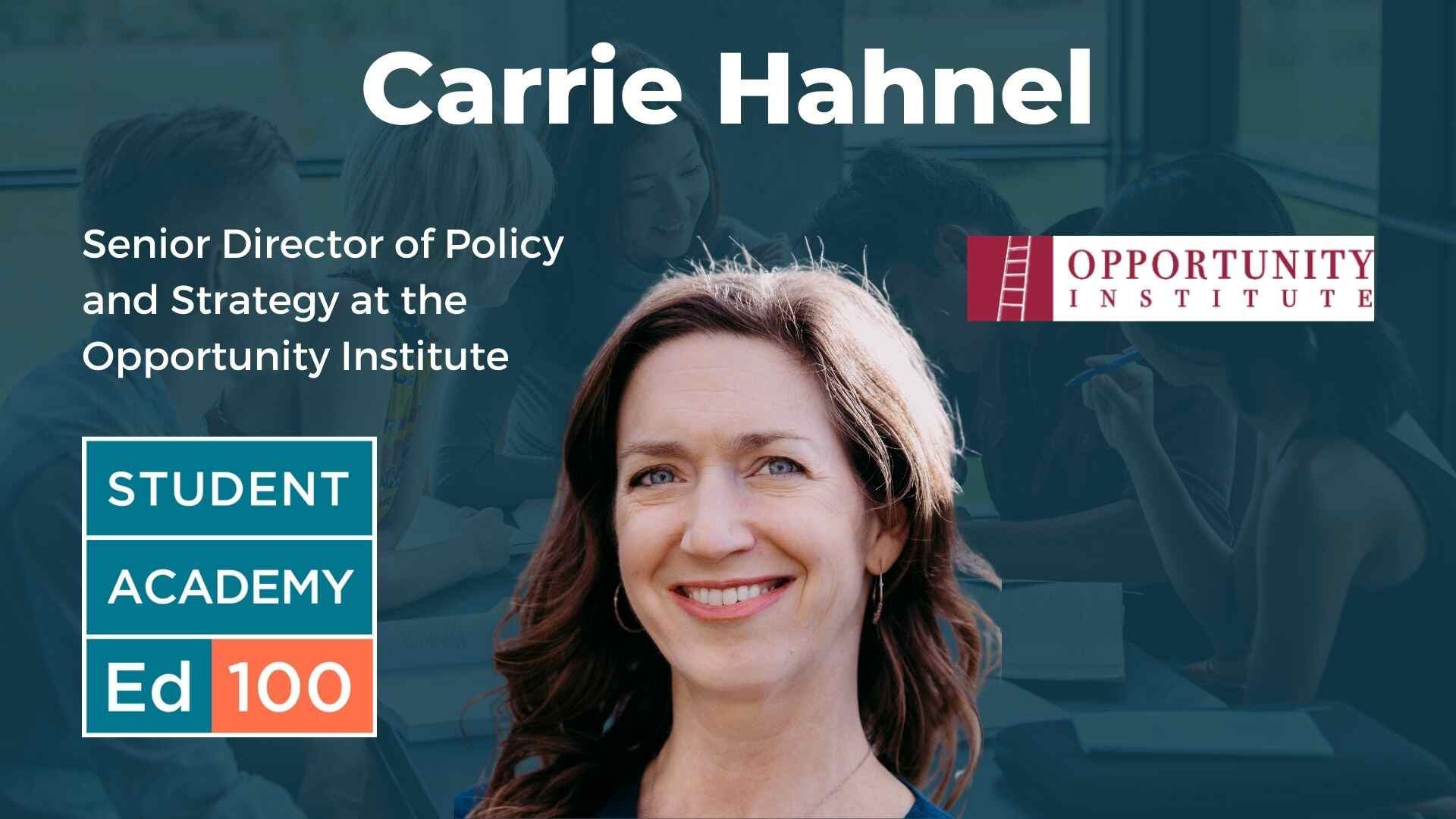The Change-maker’s Toolkit, 2022

Tools for Change
What does it take to make change happen in a school or school community? Leadership is important, obviously, but if you aren’t in a position of authority, how can you build the case for change in a way that matters?

Ben Nguyen served as an Outreach Ambassador for the Ed100 Academy in 2021 and 2022.
This summer, Carrie Hahnel presented a master class on systemic change at the 2022 Ed100 Academy for Student Leaders. Hahnel is an expert on education data and systems, particularly in California. Her goal in presenting to the Academy was to equip student leaders with information and advice they could use to make a powerful case when the way things are isn’t good enough.
Some of the tools she shared are little-known even to school board members.
Hahnel calls her presentation The Change-Maker’s Toolkit. It is divided into five parts:
- Get Data
- Find the Policy
- Read the Plan
- Seek Promising Solutions
- Ask Questions
You can watch her presentation below. Packed with information, it clocks in at just 45 minutes at 1x speed. Students rated it as one of the most useful presentations of the whole conference. She refers to many resources and links, which I’ve copied into this blog post below the video.
1) Get Data
Carrie Hahnel urged advocates and stakeholders to have data “at their fingertips”. But why?
Data allows for evidence-based solutions to back up the change you want to make. She demonstrated some resources and described others. Here are links to the data resources she featured or mentioned:
|
Data resources highlighted by Carrie Hahnel |
|
|---|---|
|
A great resource for data about your school and district and how it compares with other schools and districts. It includes deep historical data about how your district spent money a few years ago. Information from Ed-Data is difficult to share and present, so if you collect it, you are doing something new and valuable. |
|
|
Hard to navigate, but the data can be fresher than Ed-Data and somewhat different. Once you find the information you need, it’s easier to share than Ed-Data. |
|
|
National data that can provide a broader context. |
|
|
Reports about state test results and other outcomes. School climate surveys are sometimes available here. |
|
|
Data about resource disparities and educational equity. |
|
2) Find the Policy
A policy is a rule, law, or procedure that has been officially adopted by decision makers. Policies determine how your school is run. Getting information about relevant policies can be tricky, said Hahnel, because policies in education can be set at different levels — school, district, county, state, and federal. But finding them is critical for student leaders (or anyone, really) to be “part of the process.”
Many school boards use a system called GAMUT to hold their policies, which are usually structured into ten chapters recommended by the California School Boards Association. GAMUT allows you to view all the policies adopted by the school board… if you can find it! Hahnel suggested places to look, but it’s generally best to just ask someone (anyone, actually) at your district office. Sometimes there’s a password.
|
Policy resources highlighted by Carrie Hahnel |
|
|---|---|
|
School boards often record their policies using GAMUT, an online system of the California School Boards Association (CSBA). Pronounce it “GAMM-ut”. |
|
|
California laws (including the Education Code) are found here. You can also find information about the status of education-related bills under consideration. Pronounce it “ledge info”. |
|
3) Read the Plan
Every year, school districts are required to create a public three-year plan (the Local Control Accountability Plan, or LCAP, pronounced “EL-cap”) to show their goals, activities, spending plans, and more.
Before advocating for change it is smart to read the LCAP in detail. You might discover ways to frame your advocacy in ways that align with the district’s official goals. Again, you might have to ask around to find the plan, but it is required, so it definitely exists somewhere. The same is true for the required school-level plan (the SPSA).
|
Planning resources highlighted by Carrie Hahnel |
|
|---|---|
|
The Local Control Accountability Plan (LCAP) is the school district’s three-year plan. Want something to change? Get it added to the plan! Pronounce it “EL-cap”. |
|
|
School Plan for School Achievement — an annual school-level plan, usually developed by the school site council, which includes faculty, parents, and students. Pronounce it “SIP-suh”. |
|
|
Strategic Plans |
Schools and districts occasionally develop strategic plans separately from the LCAP or SPSA process. Ask whether your district currently has any task forces, and if they include students. |
4) Seek Promising Solutions
According to Hahnel, one of the best places to start when making changes is to “look to what other schools or districts are doing.” It can be much easier to do something different when there is an example to look at for inspiration.
|
Solution resources highlighted by Carrie Hahnel |
|
|---|---|
|
|
“Be a detective,” Hahnel suggests. As every student knows, Google can be a good place to begin. |
|
Research papers, reviewed with comments. These are resources you might not find through Google, but most aren’t written for easy reading! |
|
|
Wested conducts and collects research related to education for school districts, colleges, publishers, policymakers, and more. You might have to contact them for advice to find what you are looking for. |
|
|
Policy-oriented research for California education leaders. |
|
|
The Public Policy Institute of California conducts opinion polls about policy issues including education. |
|
5) Ask Questions
Hahnel advised that the art of change begins with good questions. More than protesting or commenting, she suggests, directing questions to a school board can be helpful, because it “puts the ball in their [education leaders’] court.” The board has the power to direct the administration to find the answers.
|
Resources highlighted by Carrie Hahnel |
|
|---|---|
|
School districts have a lot of authority to make changes in the ways that schools work. XQ Superschool offers good questions to ask district leaders in a series called “That’s a School Board Thing.” |
|
Present data through stories
Hahnel wrapped up her presentation with advice about how to use data. Data is most powerful, she counseled, when it is connected with a personal story. The story helps the administration understand why the data matters and who is affected. In addition, she urged students not to be shy about asking questions and asking for help. Student leaders are the ultimate stakeholders in schools. In principle, at least, the district is accountable to us.
Only a few hundred student leaders attended Hahnel’s presentation. It was exciting to be part of the audience, partly because some of the tools she shared are so little-known — even to school board members. I hope that this post will help more students learn from her. Parent leaders and other community members can benefit, too.
 Ben Nguyen is a senior at Canyon High School in Anaheim. He became a part of the Ed100 team in 2020 as an Outreach Ambassador after the inaugural conference of the Ed100 Academy for Student Leaders. He seeks to educate his peers about the education system and get them more involved in the decision making process in the district. He is part of ASB and a student member of the WASC accreditation team for his school. In his free time, Ben enjoys going on hikes, cooking new foods, and Facetiming his friends.
Ben Nguyen is a senior at Canyon High School in Anaheim. He became a part of the Ed100 team in 2020 as an Outreach Ambassador after the inaugural conference of the Ed100 Academy for Student Leaders. He seeks to educate his peers about the education system and get them more involved in the decision making process in the district. He is part of ASB and a student member of the WASC accreditation team for his school. In his free time, Ben enjoys going on hikes, cooking new foods, and Facetiming his friends.
Tags on this post
Change Student voice Local governanceAll Tags
A-G requirements Absences Accountability Accreditation Achievement gap Administrators After school Algebra API Arts Assessment At-risk students Attendance Beacon links Bilingual education Bonds Brain Brown Act Budgets Bullying Burbank Business Career Carol Dweck Categorical funds Catholic schools Certification CHAMP Change Character Education Chart Charter schools Civics Class size CMOs Collective bargaining College Common core Community schools Contest Continuous Improvement Cost of education Counselors Creativity Crossword CSBA CTA Dashboard Data Dialogue District boundaries Districts Diversity Drawing DREAM Act Dyslexia EACH Early childhood Economic growth EdPrezi EdSource EdTech Education foundations Effort Election English learners Equity ESSA Ethnic studies Ethnic studies Evaluation rubric Expanded Learning Facilities Fake News Federal Federal policy Funding Gifted Graduation rates Grit Health Help Wanted History Home schools Homeless students Homework Hours of opportunity Humanities Independence Day Indignation Infrastructure Initiatives International Jargon Khan Academy Kindergarten LCAP LCFF Leaderboard Leadership Learning Litigation Lobbyists Local control Local funding Local governance Lottery Magnet schools Map Math Media Mental Health Mindfulness Mindset Myth Myths NAEP National comparisons NCLB Nutrition Pandemic Parcel taxes Parent Engagement Parent Leader Guide Parents peanut butter Pedagogy Pensions personalized Philanthropy PISA Planning Policy Politics population Poverty Preschool Prezi Private schools Prize Project-based learning Prop 13 Prop 98 Property taxes PTA Purpose of education puzzle Quality Race Rating Schools Reading Recruiting teachers Reform Religious education Religious schools Research Retaining teachers Rigor School board School choice School Climate School Closures Science Serrano vs Priest Sex Ed Site Map Sleep Social-emotional learning Song Special ed Spending SPSA Standards Strike STRS Student motivation Student voice Success Suicide Summer Superintendent Suspensions Talent Teacher pay Teacher shortage Teachers Technology Technology in education Template Test scores Tests Time in school Time on task Trump Undocumented Unions Universal education Vaccination Values Vaping Video Volunteering Volunteers Vote Vouchers Winners Year in ReviewSharing is caring!
Password Reset
Search all lesson and blog content here.
Login with Email
We will send your Login Link to your email
address. Click on the link and you will be
logged into Ed100. No more passwords to
remember!














Questions & Comments
To comment or reply, please sign in .